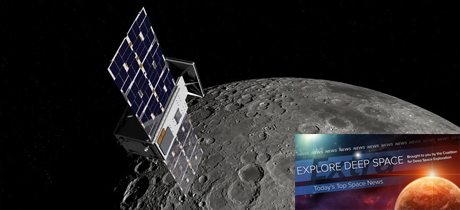In Today’s Deep Space Extra… CAPSTONE delayed until March 2022. China to launch three astronauts for a six-month stay on their space station.
Human Space Exploration
CAPSTONE launch delayed to March 2022
SpaceNews.com (10/13): CAPSTONE, a NASA SmallSat mission to try the Near Rectilinear Halo Orbit around the Moon that NASA has planned for the Gateway has been delayed until March 2022. The elliptical orbit is intended to provide the Gateway with access to a wide range of landing sites on the Moon while maintaining communications with the Earth. Rocket Lab, the launch provider for CAPSTONE, has cited delays linked to the coronavirus as the cause. Rocket Lab launches from New Zealand.
China to launch Shenzhou-13 manned spaceship on October 16
Xinhuanet of China (10/14): China plans an early Saturday (Beijing time) launch of the Shenzhou-13 spacecraft to the country’s emerging space station with a crew of three. Astronauts Zhai Zhigang, Wang Yaping, and Ye Guangfu are to spend about six months in orbit aboard the station’s Tianhe core module, the longest ever mission by Chinese astronauts. Editor’s note: Xinhuanet is a Chinese government-owned news source.
Space Science
Venus never had oceans, climate model shows
Cosmos (10/14): Rocky and similar in size to the Earth, neighboring Venus may have always been much too hot to host an ocean, according to a Swiss-led research effort published in the journal Nature. Three new missions planned by NASA and the European Space Agency (ESA) over the coming decade will attempt to settle the long running mystery over the planet’s environmental past.
Pluto’s atmosphere may be starting to condense
Spaceflightinsider.com (10/12): Pluto requires 248 Earth years to track around the sun each time. NASA’s New Horizons mission carried out the first ever close flyby of Pluto in July 2015. Scientists from the Southwest Research Institute have combined the data with new observations that suggest the distant Kuiper Belt Object’s very thin atmosphere is at a point where it’s beginning to condense and freeze.
You can blow up an asteroid just a few months before it hits Earth and prevent 99% of the damage
Universe Today (10/13): A Johns Hopkins University-led study published in the journal Acta Astronautica reasons that an impactor launched from Earth could be an effective means of destroying an asteroid on a course to collide with the Earth. And the further from Earth, the better. NASA is preparing to test the theory with the Double Asteroid Redirection Test (DART) mission due to launch on November 24 for an encounter with the double asteroid Didymos in 2022.
Opinion
Some thoughts on final frontiers, upon William Shatner’s return from space
Los Angeles Times (10/13): William Shatner, famous for his portrayal of Star Trek’s Captain Kirk, but also an articulate 90-year-old, and Hayley Arceneaux, a cancer survivor who a month earlier became at 29 the youngest American in space, have proven positive inspirations to those who followed the early flight restricted era of human spaceflight, according to Pulitzer Prize winning editorial writer Robert Greene.
Other News
Shatner overwhelmed seeing Earth from space: “Everybody in the world should do this”
Spacepolicyonline.com (10/13): Blue Origin’s NG-18 New Shepard suborbital rocket took flight from West Texas on Wednesday with four passengers, including actor William Shatner, of Star Trek Captain Kirk fame. At 90, Shatner is now the oldest person to cross the border into space, a moving experience. “Everybody in the world should do this,” he exclaimed after touching down.
Senators square off over Huntsville selection for U.S. Space Command headquarters
WAAY-TV (10/13): Reviews by the Department of Defense (DoD) inspector general (IG) and the U.S. Government Accountability Office (GAO) continue over a decision in January by the Trump administration to move the headquarters for the new U.S. Space Command from Colorado Springs, Colorado, to Huntsville, Alabama. Members of Colorado’s congressional delegation are urging President Biden to reverse the move, one they claim has national security as well as budget consequences.

